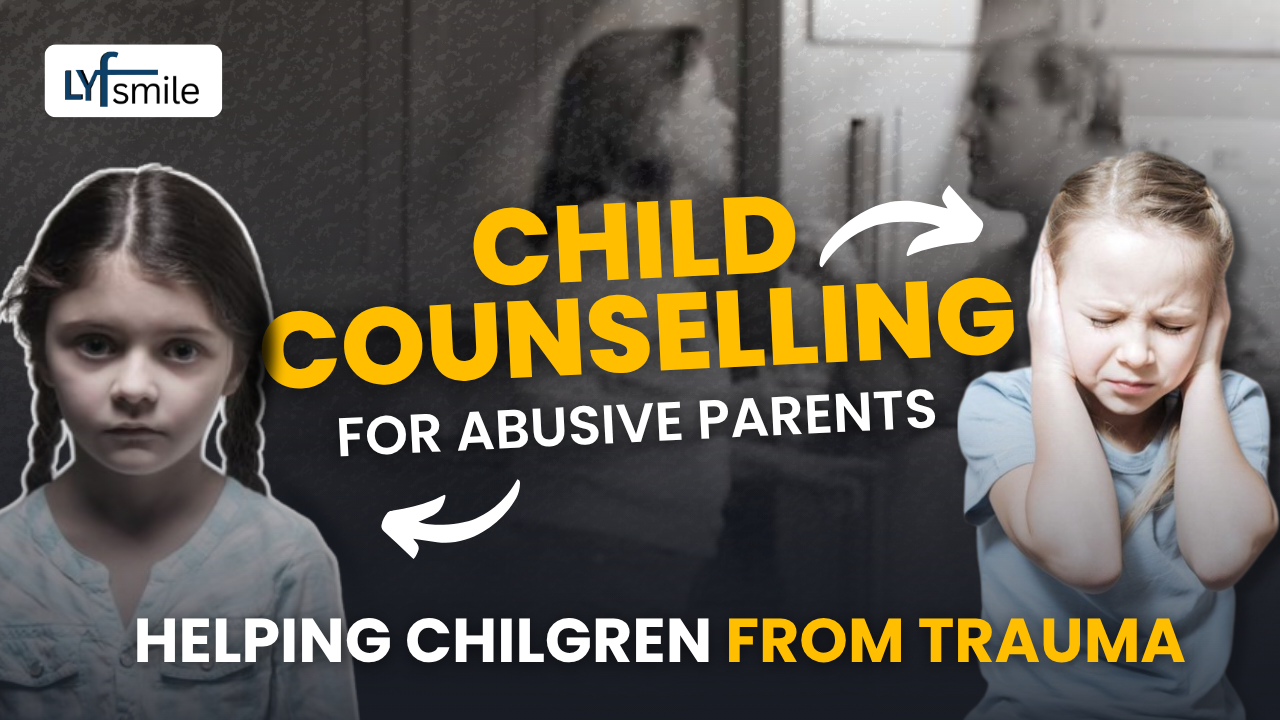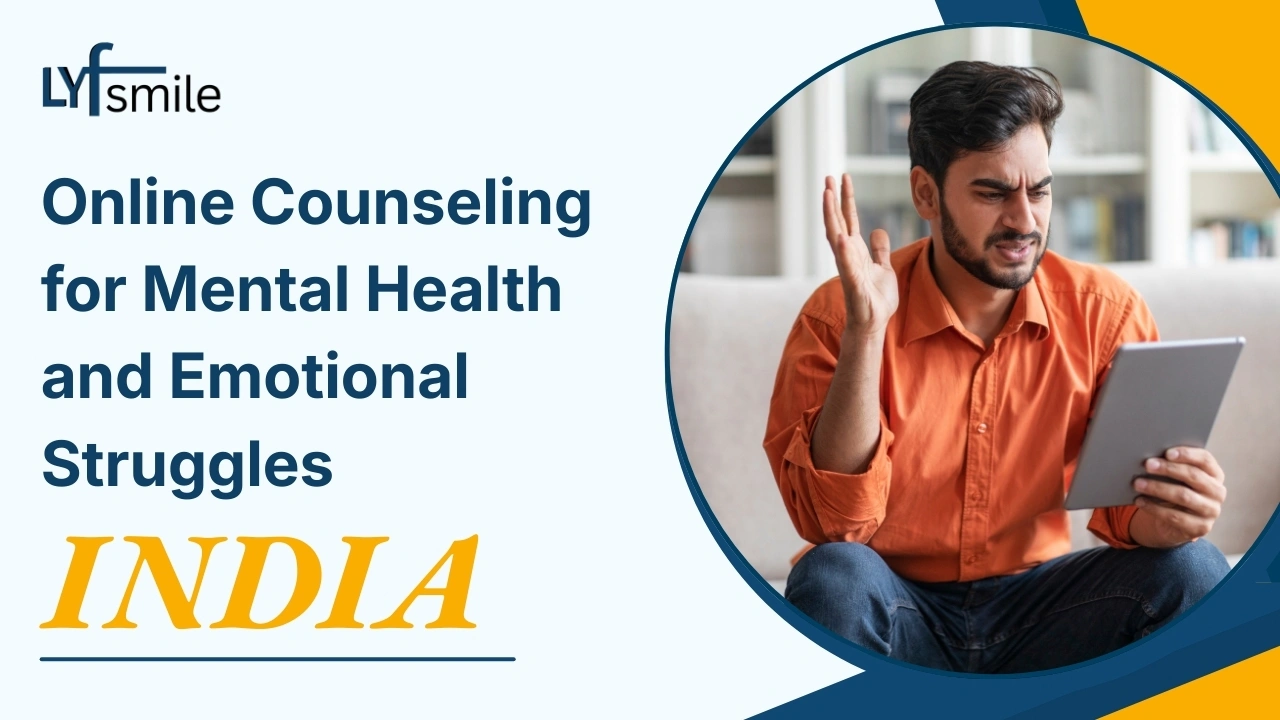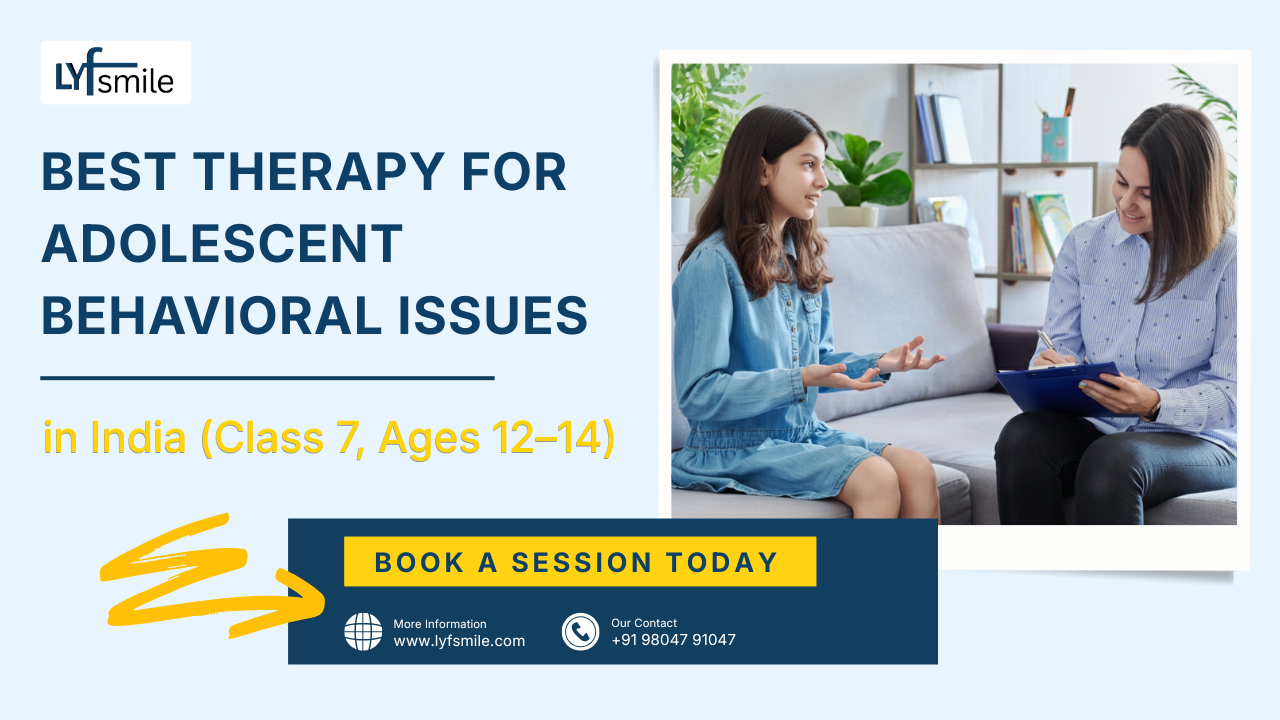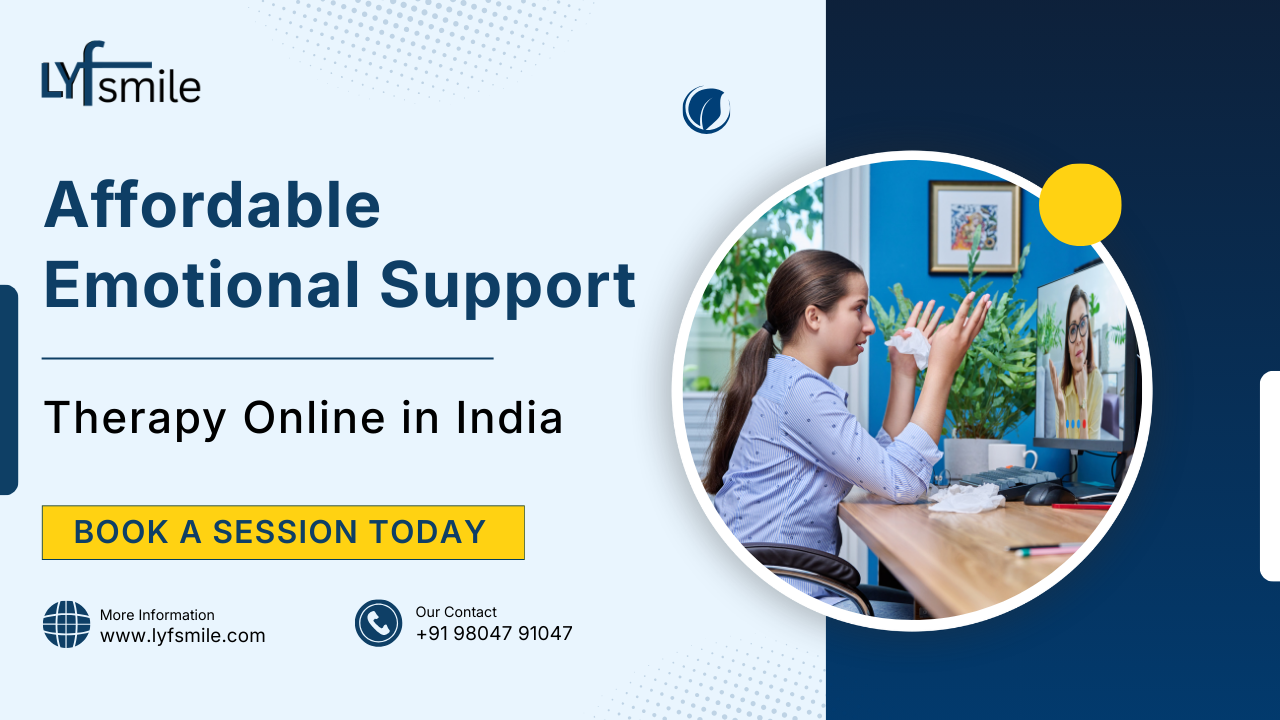
Anupam Tripathi
Child Counselling for Abusive Parents: Helping Children Heal from Trauma
Childhood should be a time of love, safety, and learning for every child. But when home becomes a place of fear and abuse, it deeply affects a child’s heart and mind. Such children often struggle to understand their emotions, start losing confidence in themselves, and their life is never the same again.
In such cases, counselling for children with abusive parents becomes a crucial step — it helps them understand their pain, overcome fear, and lead a healthy emotional life.
In this blog, we will discuss the emotional challenges faced by children living with abusive parents, how counselling can bring new hope for them, and how online counselling platforms like Lyfsmile provide professional support and healing right from home.
Child Abuse: Impact and Counselling for Children

Child abuse can take many forms, such as physical, emotional, sexual abuse, or neglect. Often, abusive parents don’t realize how deeply their actions affect a child’s mind and emotions. However, the impact is serious and long-lasting, affecting both the child’s emotional development and behaviour. In such cases, Child Counselling for Abusive Parents becomes essential to help children understand their emotions, recover from trauma, and rebuild a sense of safety and trust.
In such situations, children often feel lonely, their self-esteem drops, and forming healthy relationships becomes difficult. Some children also struggle with anxiety, depression, or trust issues. That’s why child mental health support is very important — it helps them understand their emotions, express their pain, and gradually begin to heal.
Children who grow up in abusive environments often face these challenges:
Emotional and Psychological Issues: The first impact of abuse is often on a child’s emotions. These children may struggle with anxiety, depression, and anger issues. They might feel unworthy of love and hesitate to express their feelings. Over time, their self-confidence decreases, and they learn to live with emotional pain.
Behaviour Problems: Children growing up in abusive environments express their anger and sadness in different ways. Some become aggressive or rebellious, while others withdraw and stay quiet. They may find it hard to focus on studies and often struggle to trust teachers or other adults.
Physical Health Issues: Mental trauma also affects their physical health. Such children may experience headaches, stomach pain, fatigue, or trouble sleeping. Long-term stress can weaken their immune system, increasing the risk of chronic health problems.
Difficulty in Relationships: Children from abusive homes often develop trust issues, fear of abandonment, and unhealthy attachment patterns as they grow. This affects their friendships and future romantic relationships. They may find it hard to trust others or accept love.
Academic and Social Challenges: Emotional pressure from abuse can make it difficult for children to concentrate in school. Their grades may drop, and they may avoid social activities. Some children may even become victims of bullying, further impacting their mental health.
The Value of Counselling for Children Who Have Experienced Abuse

Therapy and counselling provide essential support for children living in abusive households. Child therapy for abuse recovery offers a safe and supportive environment where children can understand their trauma, express their emotions, and develop healthy coping skills.
Here’s why child therapy for abuse recovery is so important:
Emotional Expression and Healing: Many children suppress the abuse they face, which leads to feelings of guilt and shame. Child therapy provides a safe space where they can share their experiences and understand that they are not responsible for the abuse. This helps validate their emotions and supports emotional healing.
Developing Coping Mechanisms: Therapists teach children healthy coping strategies to manage stress, anxiety, and emotional challenges in a positive way. These skills empower children to understand their fears and gradually overcome them.
Improving Self-Esteem: Abusive parents often damage a child’s self-confidence and sense of self-worth, making them feel unworthy of love and care. Counselling helps change these negative beliefs and gives children the chance to develop a positive self-image.
Building Empathy and Understanding: Therapy helps children understand their parents’ behavior — not to justify the abuse, but to process their trauma in context. This understanding supports children in managing their emotions and building healthier relationships in the future.
Safe and Supportive Environment: Many homes are not safe for children, making it crucial to have access to expert counsellor who provides a non-judgmental and confidential space. In such an environment, children can express their pain and feelings without fear and begin their emotional healing gradually.
Children in Abusive Situations Can Find Hope Through Online Counselling

Sometimes, attending in-person therapy can be very challenging for children living in abusive homes. Social stigma around therapy, combined with the potential danger if an abusive parent finds out, creates major barriers. This is why online counselling services, like Lyfsmile, can be a true lifeline for these children.
Lyfsmile is a trusted online platform that connects children, teens, and families with licensed therapists who specialize in trauma, abuse, and emotional healing. The benefits of online counselling for children growing up in abusive environments can be significant and life-changing:
Confidentiality and Safety: Online counselling provides a safe and confidential space, especially for children worried about retaliation from abusive parents. Children can choose a private spot, like their room, reducing the risk that parents will find out. This builds trust and comfort, allowing them to openly share their emotions.
Accessibility and Convenience: Platforms like Lyfsmile make it easy for children to access support, even if they live in remote areas or face financial or transportation challenges. Therapy can be accessed via phone, tablet, or computer, and scheduling sessions becomes flexible, ensuring consistent support.
Non-threatening and Comfortable Environment: Many children feel more comfortable in a virtual environment than in face-to-face sessions. Parenting Online counselling provides a relaxed, non-intimidating setting where children can share their experiences, fears, and emotions without fear, helping their healing process progress faster.
Qualified and Experienced Professionals: Lyfsmile offers licensed therapists and child mental health experts trained in handling child abuse, trauma, and emotional challenges. These professionals use age-appropriate techniques, helping children understand their experiences and gradually heal.
Continued Support and Consistency: Online counselling eliminates the fear of missing therapy due to distractions at home or transportation issues. Regular and consistent sessions help build trust, monitor emotional progress, and provide a strong support system for children.

How Lyfsmile Can Help
Lyfsmile’s online counselling services are specially designed for children going through trauma in abusive households. The platform provides a safe and secure environment where children can talk to trained therapists through messaging, voice calls, or video chats, according to their comfort level.
It is designed for children experiencing trauma from living in abusive households. The platform provides a safe and secure space where children can communicate with trained therapists through messaging, voice calls, or video chats, according to their comfort level.
Lyfsmile’s therapists are very empathetic and non-judgmental, creating a supportive environment where children feel safe to share their emotions. They work with children to help them understand their feelings, develop healthy coping strategies, and gradually heal from the trauma of abuse.
The therapists are experts in child therapy for abuse recovery and use various proven techniques, such as:
Cognitive-Behavioural Therapy (CBT) – Helps children manage negative thoughts and emotions.
Play Therapy – Provides an expressive and interactive way for children to process their trauma.
Trauma-Focused Therapy – Directly addresses the impact of emotional abuse and helps children heal.
This approach gives children the opportunity to openly express their feelings, build confidence, and gradually achieve emotional healing. Online counselling through Lyfsmile provides a convenient, confidential, and professional support system, making their trauma recovery journey stronger and more effective.
Conclusion
For children growing up in abusive households, therapy is not just a luxury—it’s a necessity. Child Counselling for Abusive Parents plays a crucial role in helping children process their experiences, heal emotional wounds, and regain their self-worth. For those silently suffering, online platforms like Lyfsmile act as a lifeline, offering accessible, confidential, and professional therapy that allows children to begin their healing journey.
As children grow, many carry the emotional effects of abuse into adolescence, making Teenagers' Counselling equally important. It helps them manage lingering trauma, improve self-esteem, and build healthier emotional connections during this sensitive stage of life.
If you or someone you know has a child in need of emotional support, don’t hesitate to seek help from trusted services like Lyfsmile. The healing journey may take time, but with the right guidance and support, children can overcome the scars of abuse and move toward a bright and healthy future.
FAQs – Counselling for Children with Abusive Parent

1. What is counselling for children with abusive parents?
Counselling is a professional therapy service that helps children deal with trauma, handle emotional stress, and recover from abuse—whether physical, emotional, or neglect.
2. How does abuse affect a child’s mental health?
Children with abusive parents may experience anxiety, depression, low self-esteem, anger, trust issues, and trouble forming healthy relationships. Counselling can help them cope and recover.
3. When should a child seek counselling?
A child should seek counselling if they show emotional distress, behavioural changes, stress-related physical symptoms (like headaches or stomachaches), fear of parents, withdrawal from school or friends, or signs of self-harm.
4. Can online counselling help children with abusive parents?
Yes! Online counselling offers a safe, confidential, and convenient way for children to talk to trained therapists from home. It reduces fear of retaliation and is accessible even in remote areas.
5. What types of therapy are used for abused children?
Common therapies include Cognitive Behavioural Therapy (CBT), Trauma-Focused Therapy, Play Therapy, and Art Therapy. These methods help children express emotions, build coping skills, and heal.
6. How long does counselling take for children with abusive parents?
The duration depends on the abuse severity and the child’s emotional state. Some children may need a few months, while others benefit from long-term therapy. Consistency is important for effective recovery.
7. What role do parents or guardians play in counselling?
Non-abusive parents or guardians may be involved to provide a supportive environment. Therapists guide them on creating a safe space at home and understanding the child’s emotional needs.
8. How can I help my child if they are experiencing abuse?
Listen without judgment, reassure them it’s not their fault, and seek professional counselling. Avoid confronting the abusive parent alone, as this could be risky.
9. Are counselling sessions safe and confidential for children?
Yes. Professional therapists ensure strict confidentiality. Both online and in-person sessions are conducted in a secure, non-judgmental environment so children feel safe to share their feelings.
10. What are the benefits of counselling for abused children?
Counselling helps children process trauma, build emotional resilience, improve self-esteem, form healthy relationships, learn coping strategies, and regain a sense of security and trust.








